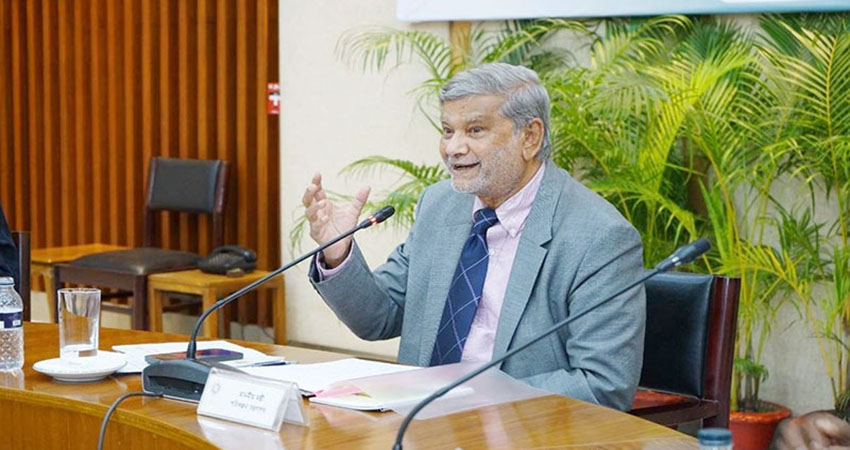The readymade garment (RMG) manufacturers and exporters of the country set a target of exporting apparel worth $100 billion by 2030.
Moreover, they are also expecting to create employment for six million people in the apparel sector during the period by ensuring 100% gender equality, inclusiveness, and a decent workplace.
Bangladesh Garment Manufacturers and Exporters Association (BGMEA), expressed these intentions while unveiling its new logo and its renewed vision in line with sustainability strategy and circularity.
National Parliament Speaker Dr Shirin Sharmin was present there as chief guest and also launched the trade body's new logo.
BGMEA President Faruque Hassan, former president Abdus Salam Murshedy and its current board members were also present at the event.
Miran Ali, vice-president of the BGMEA, presented the keynote presentation regarding the story behind the new logo.
In the new logo, the nine dots represent its legacy of people, inclusivity, transparency, infrastructure, innovation, circularity, global network, brand and environment.
According to the sustainable strategic vision- 2030, the trade will be able to gain environment, social, and governance (ESG) by 2030.
In line with Sustainable Development Goal (SDG), the apparel exporters will reduce emissions of GHG by 30% by 2030.
They will use at least 50% of sustainable materials mix and will reduce 50% of blue water footprint by this time.
The sector will be able to reduce energy consumption by 30% and will use at least 20% of renewable energy by 2030.
Apparel manufacturers will invest $1 billion in sustainable communities and will create six million jobs by the targeted year, ensuring 100% institutionalization of skill development, good health and well-being employment.
By 2030, the sector will ensure 100% sustainability data reporting, 80% green factories, 60% increase in production efficiency, 100% global export footprint, 100% good governance, and setting up 100% SDGs stakeholders.
In her speech as chief guest, Shireen Sharmin Chowdhury said that Bangladesh used to be called a bottomless basket; today's Bangladesh is no longer that.
“Many attempts have been made to make Bangladesh a failed state, but in the course of time Bangladesh has thwarted that effort and touched the milestone of $50 billion export earnings,” she added.
She also said that the BGMEA is a global organization, they operate in tandem with the global environment and this transformation, the announcement of a new vision, is a reflection of keeping pace with the international market.
“BGMEA is moving forward with priority on sustainable development. At present, there is political stability in the country and it must be used to move forward,” she added.
BGMEA President Faruque Hassan said when asked how $100 billion export revenue is possible, he said along with basic export items, they need to focus on man-made fibres, technical textiles and high-value products.
“For the first time, we participated in the Technical Textile Fair. We need to focus on intra-industry variation,” he added.
Asked whether the industry is now ready to produce technical textiles, Faruque Hassan said they are now ready to make high-value products.
He also added saying, earlier there was an issue regarding the material, but now the country's backward linkage sector is self-sufficient and many are also importing.
Due to the huge demand, the country's backward linkage sector factories are expanding along with new investments.
“Spinning Mills have major investments of $2.5 million, most of which is manmade fibre,” he added.
Responding to a question about how they’ll achieve this vision, Faruque Hassan said that they are working on the mechanism and will soon publish it.
“There was a target of $50 billion in revenue by 2021, but for various reasons, it did not happen. However, we are hopeful that in 2023, our revenue from this sector will exceed that amount,” he added.
He also said that circularity, recycling and transparency are now mandatory, not an option.
“We want to focus more on the environment and related issues, as buyers and development partners also want these,” he added.
He also said that they are committed to these and now want to work on a larger scale.
“It is also possible to ensure fair prices if we can produce in alignment with sustainability and circularity,” he added.
Bangladesh fetched $42.62 billion from RMG exports in the last fiscal year with a YoY growth of 37.45%, which is about 82% of the total $52.08 billion.



















